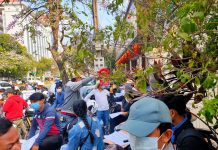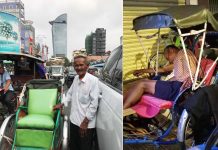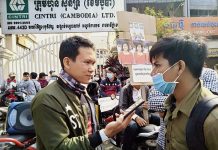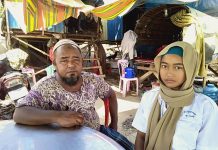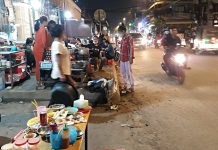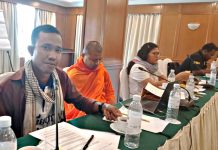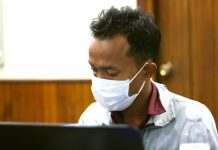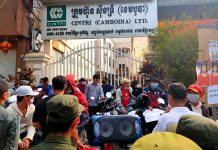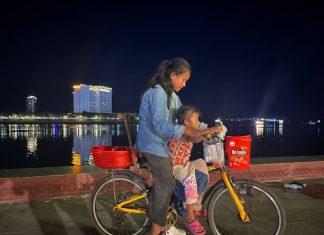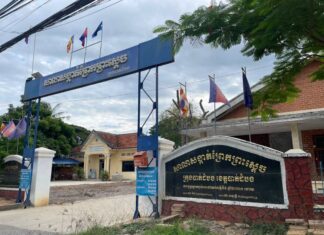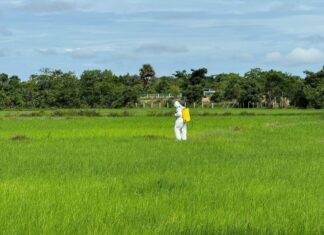ការយល់ដឹងពីមូលដ្ឋានច្បាប់ស្ដីពីរបបសារព័ត៌មាន
នៅក្នុងបន្ទប់ព័ត៌មាន(NEWSROOM)កាលពីម្សិលមិញ ខ្ញុំជាមួយនឹងមិត្ដរួមជំនាន់របស់ខ្ញុំ បានទទួលការបណ្ដុះបណ្ដាលវគ្គខ្លីមួយអំពី«មូលដ្ឋានច្បាប់ស្ដីពីរបបសារព័ត៌មាន» ដែលធ្វើបទបង្ហាញដោយលោកមេធាវី សេក សុភ័ណ្ឌ។
តំណាងសហជីពគ្រោង ដាក់លិខិតស្នើសុំក្រសួងការងារ ផ្អាកវិសោធនកម្មច្បាប់កាត់បន្ថយប្រាក់ឈ្នួលវេនយប់
តំណាងសហជីព គ្រោងនឹងដាក់លិខិតស្នើទៅក្រសួងការងារ និង បណ្តុះបណ្តាលវិជ្ជាជីវៈ ដើម្បីសុំឲ្យក្រសួងនេះ ផ្អាកវិសោធនកម្មច្បាប់ស្តីពីការងារ ដោយកាត់បន្ថយប្រាក់ឈ្នួលកម្មករវេនយប់ពី១៣០ភាគរយ មកត្រឹម ១០០ភាគរយ។
អតីតបុគ្គលិក ស៊ីនទ្រី ជាង១០០នាក់ ទទួលប្រាក់សំណងពីសាលារាជធានីភ្នំពេញ
សាលារាជធានីភ្នំពេញសម្រេចផ្តល់សំណងជំនួស ដល់អតីតបុគ្គលិកក្រុមហ៊ុនស៊ីនទ្រីជាង១០០នាក់ ដែលបានបញ្ឈប់ពីការងារ កាលពីចុងខែធ្នូ ឆ្នាំ២០១៩ ប៉ុន្តែបដិសេធផ្តល់ការងារនៅ រដ្ឋករស្វយ័ត។
Cyclo Grandpas: The 80-Year-Olds Living, Pedaling Without a Roof
Every day, before the sun shines, sweat starts to slowly stream down his forehead. His feet push hard on the pedals to make the cyclo go. His shaking hands steer cautiously to his destination.
The Stress of Working on Sensitive Topics
When I work as a lifestyle journalist, I write easy articles. I don’t care too much about sources, interviews or quotes.
បើចង់រៀន សារព័ត៌មាន ដោយសារលុយ សូមកុំរៀនអី
តើអ្នក ចាប់អារម្មណ៍ សារព័ត៌មាន មែនទេ? អ្វីដែល ធ្វើអោយ អ្នកចាប់អារម្មណ៍ រឿងចំណូល ពីការសរសេរ ព័ត៌មាន?
សិស្សខ្មែរឥស្លាមជាង១០០នាក់ បោះបង់ ការសិក្សា ក្រោយអាជ្ញាធរខណ្ឌ បញ្ជារុះរើផ្ទះខ្ទម
សិស្សខ្មែរឥស្លាម ជិត២០០នាក់ ក្នុងសាលាមួយ នៅខណ្ឌជ្រោយចង្វារ រាធានីភ្នំពេញ បានបោះបង់ការសិក្សា បន្ទាប់ពីអាជ្ញាធរខណ្ឌ បញ្ជាឲ្យគ្រួសាររបស់ពួកគេរុះរើផ្ទះតូចៗចេញពី ច្រាំងទន្លេមេគង្គ ដែលពួកគេសង់នៅបណ្តោះអាសន្ន។
Tales of Opportunists in a Gullible Kingdom
Once upon a time, there was a rumor about “holy green beans” that spread throughout the kingdom. According to this tale, “Everyone must eat green beans before sunrise or die” from SARS, a well-known flu that killed many people in Asia.
Wearing a Mask to Escape From People?
Why are people wearing masks? Everyone knows that coronavirus is the huge new problem disease from China. But what’s the reality in Cambodia?
ខ្ញុំ ជា មួយ នឹង វិថី អ្នកសារ ព័ត៌មាន
ខ្ញុំមានការរីករាយ មែនទែន ដែលបាន ទៅចូល រួមវគ្គបណ្ដុះបណ្ដា មួយស្ដីពី «សិទ្ធិការងារ និងសហជីព» ដែលរៀបចំ ឡើងដោយ សម្ព័ន្ធអ្នកសារព័ត៌មានកម្ពុជា ហៅកាត់ថា ខេមបូចា(CamboJA) កាលពីថ្ងៃទី២៤-២៥ ខែមករា ឆ្នាំ២០២០ កន្លងទៅ។ វាបានធ្វើឱ្យ ខ្ញុំកាន់តែយល់ដឹងច្រើនជាងមុន ពីអ្វីដែល ហៅថា ជីវិតជាអ្នកសារព័ត៌។
ជំងឺអវិជ្ជា និងអមនុស្សធម៌ គួរឲ្យខ្លាច ជាងកូរ៉ូណា
មិនគួរពលរដ្ឋ មួយចំនួនដែលឆ្លៀត តម្លើងថ្លៃម៉ាស់ មិនសង្គ្រោះ តែសម្ពាធ (កម្មបានផ្ដល់ដល់ អ្នកគឺគេមិនចូលចិត្ត ហាងអ្នក) ត្រីងៀតឆ្លៀតពង។
Ignorance and Inhumanity Are Greater Concerns Than Coronavirus
While the virus threatens the world, some Cambodian pharmacies have increased the price of masks.
The Panic Attack After My Vacation
Chinese New Year this year was on Saturday and Sunday, which was a good chance for me to go on vacation.
អតីតបុគ្គលិក ស៊ីនទ្រី តវ៉ាជាលើកទី២ ក្រោយគ្មានដំណោះស្រាយ
អតីតបុគ្គលិកស៊ីនទ្រី ជាង១០០នាក់ បន្តតវ៉ា នៅមុខក្រុមហ៊ុន ក្នុងក្រុងភ្នំពេញ នៅថ្ងៃព្រហស្បតិ៍នេះ ដើម្បីទាមទារប្រាក់អតីតភាពការងារ១០០ភាគរយ បន្ទាប់ពីពួកគេត្រូវបានបញ្ឈប់ពីការងារ។
Small Ecotourism Community Struggles to Compete as Sector Grows
An ecotourism community on the Mekong river says it is struggling to attract local tourists, with off-the-beaten-track destinations a hard sell for Cambodian travelers who typically prefer popular sites and comfortable resorts, tour operators say.
តំណាងអយ្យការ ក្រុងភ្នំពេញ សួរ លោក កឹម សុខា មួយព្រឹក ឲ្យបកស្រាយពាក្យ«គេ»
សាលាដំបូងរាជធានីភ្នំពេញ បានចំណាយពេលមួយព្រឹកនៅថ្ងៃពុធម្សិលមិញ ដើម្បីសួរដេញដោល លោក កឹម សុខា បកស្រាយពាក្យ«គេ» ដែលលោកបាននិយាយ នៅក្នុង ឃ្លីបវីដេអូ កាលពីឆ្នាំ២០១៣ នៅប្រទេសអូស្ត្រាលី។




